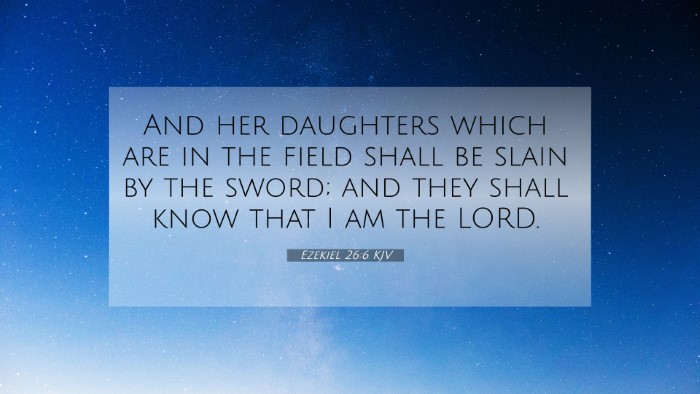Ezekiel 26:6 - Meaning and Interpretation
Ezekiel 26:6 states, "And her daughters, which are in the field, shall be slain by the sword; and they shall know that I am the Lord." This verse reflects God's judgment upon Tyre through the prophet Ezekiel, emphasizing the destruction that is to come upon her and her territories.
Summary of Biblical Context
The context of Ezekiel 26 is a prophecy against Tyre, a prosperous and influential city in ancient Phoenicia. God, through Ezekiel, predicts the city's devastation, representing divine retribution for its pride and idolatry. The "daughters" mentioned are likely the surrounding cities and territories that relied on Tyre's commerce and strength.
Insights from Public Domain Commentaries
- Matthew Henry: Henry emphasizes that the judgment foretold highlights the totality of the destruction, both immediate and far-reaching. By mentioning "her daughters," it reflects not only the physical cities but also the spiritual ramifications of Tyre's impending collapse.
- Albert Barnes: Barnes points out the significance of the phrase "shall know that I am the Lord." This indicates a dual purpose in God's judgment: to punish Tyre for its sins and to demonstrate His sovereignty to all nations. The swift and severe nature of the punishment serves as a clear sign of God’s authority.
- Adam Clarke: Clarke notes that this verse serves as a warning; Tyre's destruction was inevitable due to its hubris and corruption. He elaborates on the concept of divine justice, wherein nations that defy God can expect eventual accountability, demonstrated through this prophecy.
Key Themes and Connections
The themes present in Ezekiel 26:6 include divine judgment, accountability of nations, and the declaration of God's sovereignty. The verse illustrates how God utilizes worldly events to manifest His power and might. Below are notable Bible verse cross-references that relate to this theme:
- Isaiah 23:1-18 - This passage also addresses the fall of Tyre, foreshadowing its doom similarly to Ezekiel's prophecy.
- Jeremiah 47:4 - Discusses the destruction of the Philistines, indicating that divine judgment can extend beyond Tyre to neighboring nations.
- Ezekiel 25:15-17 - This chapter conveys judgment against other nations surrounding Israel, fitting the broader theme of righteousness and correction through disaster.
- Revelation 18:10 - Portrays prophetic judgement against "Babylon," drawing parallels to Tyre as an example of prideful nations facing God’s wrath.
- Ezekiel 28:18-19 - Provides insight into the pride that leads to destruction; relevant as Tyre's downfall stems from its perceived invincibility.
- Psalm 37:20 - Affirms the theme of divine justice wherein evildoers face eventual consequences for their actions.
- Proverbs 16:18 - Believers are reminded that pride leads to a fall, well illustrated through Tyre's fate.
- 2 Peter 2:9 - Highlights God's ability to deliver the righteous while reserving the unjust for punishment, reinforcing the idea that God rules over all nations.
- Jeremiah 51:24 - Reflects on God taking vengeance upon nations, similar to His actions against Tyre.
- Lamentations 3:36 - Affirms God's justice in administering judgment, underlining that He does not overlook sin.
Cross-Referencing Biblical Texts
The theme of divine justice and punishment for prideful nations unifies these scripture references, illustrating connections between Bible verses. When engaging in Bible cross-reference guide, readers may find it valuable to compare the outcomes of those who defy God's will. Additionally, understanding how to use Bible cross-references can deepen one’s biblical studies.
Implications for Today
Understanding Ezekiel 26:6 in light of its context and cross-referenced scriptures reminds believers of God's sovereignty and the seriousness of sin. While Tyre served as an ancient example, the principles behind its judgment resonate through biblical history and modern faith. Through careful cross-referencing Bible study methods, individuals can uncover rich thematic links across scripture, gaining deeper insights into their faith and understanding of God.
Conclusion
The prophecy found in Ezekiel 26:6 serves as a poignant reminder of God's command over nations and the importance of humility before Him. The interconnectedness of scripture allows us to explore the depths of God's character through the lens of typological parallels and historical realities.











